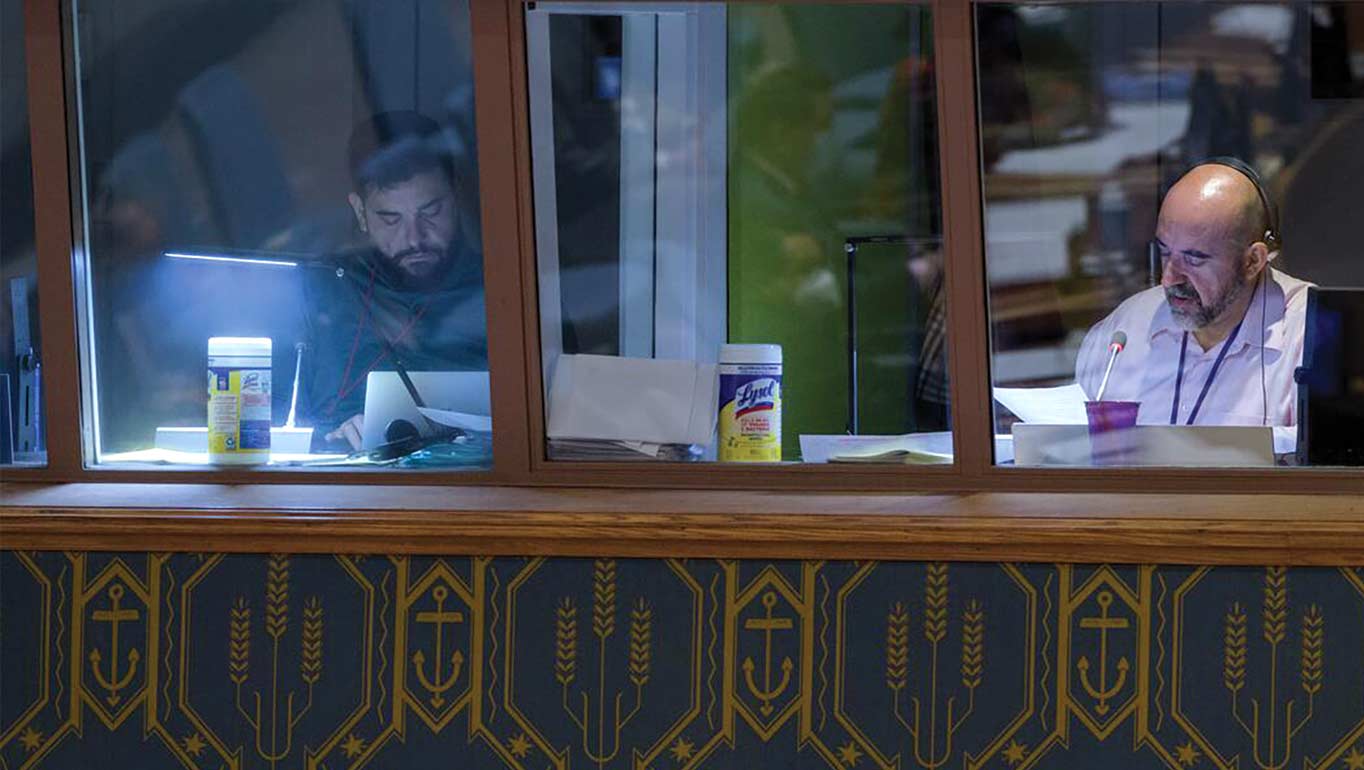Diversity is good for all of us”, said Ana Casades matter-of-factly, as she shrugged and looked across to me. “It goes to the core of what the UN is about,” added her colleague, María Carolina López Uribe. Ms. Casades and Ms. López Uribe are both Spanish language interpreters who have recently participated as trainers in the Latin America and Caribbean training initiative, a project focused on broadening geographic representation in the Spanish interpretation sections of all four duty stations. On a cold Geneva afternoon, they met with me to talk about the project and the importance of diversity for the United Nations.
The Latin America and Caribbean training initiative was born as a result of resolution 76/237 which requests the Secretary-General to “close the wide gap of qualified candidates from Africa and from the Latin America and Caribbean region” through traineeships and internship programs. This wide gap is something that Ms. López Uribe has experienced personally during her career. “When I arrived here in Geneva,” she recalled, “I was the only Latin American voice [the delegates] would hear.”
To improve this status quo and in compliance with resolution 76/237, the chief of the Spanish interpretation section at the United Nations headquarters in New York, Mr. Adrián Delgado, with the support of leadership at all four duty stations, assembled a team of eight trainers. Faculty from the Monterrey Institute of International Studies (MIIS), which has a Memorandum of Understanding with the United Nations on cooperation and training for language professionals, helped craft the traineeship´s program. Ana María Correa Paris, a Spanish language staff interpreter at United Nations Office in Nairobi, oversaw the coordination of all these moving parts.
Before the initiative began, all trainers took part in multiple sessions focused on the training of trainers with professors from MIIS, as well as colleagues from the French interpretation section. “We established criteria for training, for evaluation, and for finding appropriate teaching materials,” Ms. Casades explained. Trainers discussed at length “how to make potential future candidates feel safe, welcome, and that there was progression to keep them motivated.”
After receiving training, the group of trainers taught a one-week intensive summer course. During the course, 21 participants from Latin America and the Caribbean were able to practice with actual speeches from the United Nations and receive feedback in real time. The week ended with a mock exam, “which was absolutely unofficial and completely for teaching purposes,” noted Ms. Casades, and allowed trainers to select 10 promising candidates to continue with individual coaching sessions during the fall semester.
The ultimate goal is to give these potential candidates from Latin America all the tools they need to successfully pass the UN´s competitive language examinations. The unity of purpose among the trainers was palpable in their enthusiasm. “We are hoping all these people will be ready to take the competitive exam and directly result in the implementation of a diverse Spanish booth,” said Ms. Casades. “We have given them a hand. Now, they´re ready to take the test,” Ms. López Uribe pointed out, “but at the end of the day, they will have to pass the exam like everyone else.”
The final part of Ms. López Uribe´s sentence, “like everyone else,” gave me pause. I asked my colleagues whether some folks have expressed misgivings about the initiative and how they would respond to people who might feel uneasy about the project. “When it comes to this initiative,” Ms. López Uribe replied, “I think there are so many good reasons to justify it that I have a hard time seeing why not.” She went on to cite the myriad of difficulties that candidates from Latin America encounter when trying to become interpreters at the United Nations, such as a lack of training opportunities in the region, difficulty paying for tuition abroad due to weak currencies, distance from major international conference hubs, and barriers in obtaining visas to study and work abroad.
Ms. Casades, from Spain, had an answer that was equally poignant. “I believe in diversifying possibilities and opportunities. That doesn’t mean a blank check for anyone who comes from a minority group or an underprivileged background, obviously, because what we all want, in the end, is excellence at the UN. In order to reach excellence, we need diversity. I absolutely believe that we have brought up to speed the required level of training so students from diverse backgrounds can pass the competitive exam, which will give us a more diverse, more professional UN, geared towards excellence.”
Deeply moved by my colleagues´ commitment to the United Nations and its values, I asked them for a few final words about the Latin America and Caribbean training initiative. “It’s been fantastic,” Ms. Casades concluded while flashing a warm, wide smile. “My closing message,” answered Ms. López Uribe, “is not only that it’s been fantastic, but that I hope it survives and that it continues until we level the playing field.”



